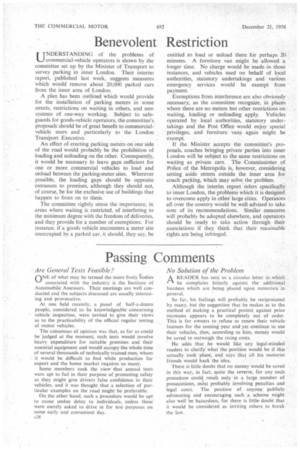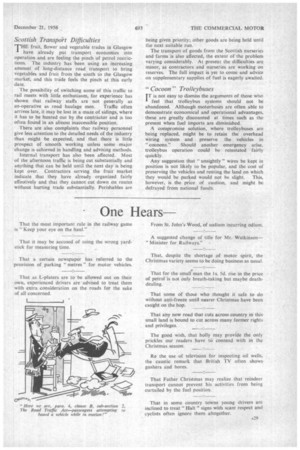Passing Comments
Page 30

Page 31

If you've noticed an error in this article please click here to report it so we can fix it.
Are General Tests Feasible?
0NE of what may be termed the more lively todies
associated with the industry is the Institute of Automobile Assessors. Their meetings are well conducted and the subjects discussed are usually interesting and provocative.
At one held recently, a panel of half-a-dozen people, considered to be knowledgeable concerning vehicle inspection, were invited to give their views as to the practicability of the official regular testing of motor vehicles.
The ccinsensus of opinion was that, as far as could be judged at the moment, such tests would involve heavy expenditure for suitable premises and their essential equipment and would occupy the whole time of several thousands of technically trained men, whom it would be difficult to find while production for export and the home market requires so many.
Some members took the yiew that annual tests were apt to fail in their purpose of promoting safety as they might give drivers false confidence in their vehicles, and it was thought that a selection of particular examples on the road might be preferable.
On, the other hand, such a procedure would be apt to cause undue delay to individuals, unless these were merely asked to drive in for test purposes on some early and convenient day.
n28
No Solution of the Problem
A READER has sent us a circular letter in which 1-1 he complains bitterly against the additional burdens which are being placed upon motorists in general.
So far, his feelings will probably be reciprocated by many, but the suggestion that he makes as to the method of making a practical protest against price increases appears to be completely out of order. This is for owners to refuse to renew their vehicle licences for the coming year and yet continue to use their vehicles, thus, according to him, money would be saved to outweigh the rising costs.,
He adds that . he would like any legal-minded readers to clarify what the position would be if this actually took place, and says that all his motorist friends would back the idea.
There is little doubt that no money would be saved in this way, in fact, quite the reverse, for any such procedure Could result only in a large number of prosecutions, mo-st probably involving penalties and legal costs. The position of anyone publicly advocating and encouraging such a scheme might also well be hazardous, for there is little doubt that it would be considered as inviting others to break the law.
Scottish Transport Difficulties
'J THEfruit, flower and vegetable trades in Glasgow 'HE already put transport economies into operation and are feeling the pinch of petrol restrictions. The industry has been using an increasing amount of long-distance road transport to bring vegetables and fruit from the south to the Glasgow market, and this trade feels the pinch at this early date.
The possibility of switching some of this traffic to rail meets with little enthusiasm, for experience has shown that railway staffs are not generally as
co-operative as road haulage men. Traffic often arrives late, it may be lost in a maze of sidings, where it has to be hunted out by the contractor and is too often found in an almost inaccessible position.
There are also complaints that railway personnel give less attention to the detailed needs of the industry than might be expected, and that there is little prospect of smooth working unless some major change is achieved in handling and advising methods.
Internal transport has also been affected. Most of the afternoon traffic is being cut substantially and anything that can be held until the next day is being kept over. Contractors serving the fruit market indicate that they have already organized fairly effectively and that they cannot cut down on routes without hurting trade substantially. Perishables are being given priority; other goods are being held until the next suitable run.
The transport of goods from the Scottish nurseries and-farms is also affected, the extent of the problem varying considerably. At present the difficulties are minor, as contractors and nurseries are working on reserves. The full impact is yet to come and advice on supplementary supplies of fuel is eagerly awaited.
"Cocoon" Trolleybuses
pis not easy to dismiss the arguments of those who I feel that trolleybus systems should not be abandoned. Although motorbuses are often able to demonstrate economical and operational advantages, these are greatly discounted at times such as the present when fuel imports are diminished.
A compromise solution, where trolleybuses are being replaced, might be to retain the overhead wiring system and preserve the vehicles in "cocoons." Should another emergency arise, trolleybus operation could be reinstated fairly quickly.
Any suggestion that "unsightly" wires be kept in position is not likely to be popular, and the cost of preserving the vehicles and renting the land on which they would be parked would not be slight. This, however, is the price of caution, and might be defrayed from national funds.




























































































